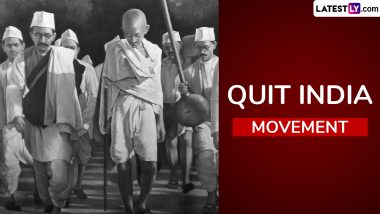The Quit India Movement Day, also known as the August Movement or August Kranti, was a historic event in the Indian independence struggle against British colonial rule. It was launched on August 8, 1942, by Mahatma Gandhi and the Indian National Congress (INC) at the Bombay session of the All-India Congress Committee. The movement was launched during World War II with an aim to demand an end to British rule in India. After the British failed to secure Indian support for the British war effort with the Cripps Mission, Mahatma Gandhi made a call to Do or Die in his Quit India speech delivered in Bombay on August 8, 1942 at the Gowalia Tank Maidan. Viceroy Linlithgow described the movement as ‘the most serious rebellion since 1857’. August 2024 Festivals, Events and Holidays Calendar: Complete List of Important National and International Days and Dates in August.
The Quit India Movement witnessed widespread participation from various sections of Indian society, including students, workers, farmers, and women. People engaged in strikes, demonstrations, and acts of civil disobedience across the country demanding an end to the British rule in India. The All India Congress Committee launched a mass protest demanding what Gandhi called "An Orderly British Withdrawal" from India. Even though it was at war, Britain was prepared to act. Almost the entire leadership of the Indian National Congress was imprisoned without trial within hours of Gandhi's speech. In this article, let’s know more about the historic Quit India Movement.
Quit India Movement Day 2024 Date
Quit India Movement Day 2024 falls on Thursday, August 8.
Quit India Movement Day Significance
The Quit India Movement holds great significance in the struggle for independence in India. The movement did not immediately result in independence, but it intensified the struggle for freedom across the country. It showcased the determination of the Indian people and weakened British control over India. The movement included boycotting the British government and rejection of transactions involving the government.
Various violent incidents took place around the country against the British regime with the British arresting thousands of leaders, and keeping them imprisoned until 1945. The movement ended in 1945 with the release of jailed freedom fighters. Martyrs of this freedom movement include Mukunda Kakati, Matangini Hazra, Kanaklata Barua, Kushal Konwar, Bhogeswari Phukanani and others.
(The above story first appeared on LatestLY on Aug 07, 2024 05:00 PM IST. For more news and updates on politics, world, sports, entertainment and lifestyle, log on to our website latestly.com).













 Quickly
Quickly




















